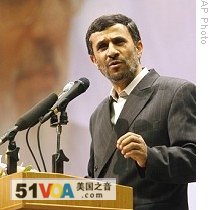Cairo
27 June 2009
 |
| Iranian President Mahmoud Ahmadinejad, Tehran, 27 Jun 2009 (Image issued by Iranian Students News Agency) |
President Ahmedinejad, speaking on the Iranian News Network (IRINN) lashed out Saturday at both President Obama and the West for recent criticism of Iran's brutal handling of popular demonstrations.
He complained that President Obama has spoken of reform and of change, so why has he interfered in a manner that goes against convention and of courtesy? The Iranian nation, he warns, will make you (Mr. Obama) feel regret, if you continue to interfere and behave rudely.
In a symbolic move, the Iranian president made his remarks in front of the Iranian judiciary, which has been tasked with meting out punishment to those opposition leaders, professors, journalists, and students who have been arrested in recent crackdowns.
According to Iran's student news agency (ISNA), Mr. Ahmedinejad also vowed to formulate a tough response to European leaders if they continued, in his words, to meddle in Iran's domestic affairs.
"It is enough," he charged. He said,"Do not disgrace yourself any further by such language and behavior." He also claimed that Iran would put their "insulting and irrelevant comments on trial," at each and every "international gathering."
The Iranian president has kept a relatively low profile in recent days, during the wave of popular demonstrations across the country, following the disputed June 12th presidential election in which he was declared the winner, allegedly by a landslide.
Friday, President Obama called Iran's recent crackdown on opposition protests, following the disputed election, "outrageous." He also asserted that any direct talks or diplomacy with Iran would be affected by the recent events.
Mr. Obama did say, however, that talks between Iran and the five permanent members of the United Nations Security Council, plus Germany, over Tehran's nuclear program would probably continue. "My expectation," the President said, "?would be that you're going to continue to see some multilateral discussions with Iran."
Middle East analyst Khattar Abou Diab, who is a Professor at the University of Paris III, however, thinks that despite all President Obama's efforts, Mr. Ahmedinejad has no intention of pursuing a dialogue with the West:
He said that we have witnessed a mass popular movement in Iran linked to its internal situation and popular desperation with President Ahmedinejad over the economic situation. President Obama's overture towards Iran, he notes, has also influenced events in Iran. President Obama, he argues, has remained prudent, so as not to be accused of meddling in internal Iranian affairs, whereas, Diab says, the Iranian president, once again, has proven that he has no intention to open a real dialogue with the West.
Meanwhile, the Iranian News Network (IRINN) complained that the U.S. had refused to issue a visa to an Iranian delegation, including Vice President Parviz Dawoudi, which was scheduled to attend a United Nations economic conference in New York.
Friday, at a meeting of the G-8 foreign ministers in Trieste, Italy, the ministers declared that they fully respect the sovereignty of Iran, but at the same time, they say they deplore the post-election violence which has led to the loss of lives and urge Iran to respect fundamental human rights.
Inside Iran, according to the ILNA news agency, a top religious leader, Ayatollah Abdolkarim Ardebili, is saying that the solution to prevent post election protests from spreading in the streets is to give demonstrators a channel to express their views, either through television or through a legal gathering.